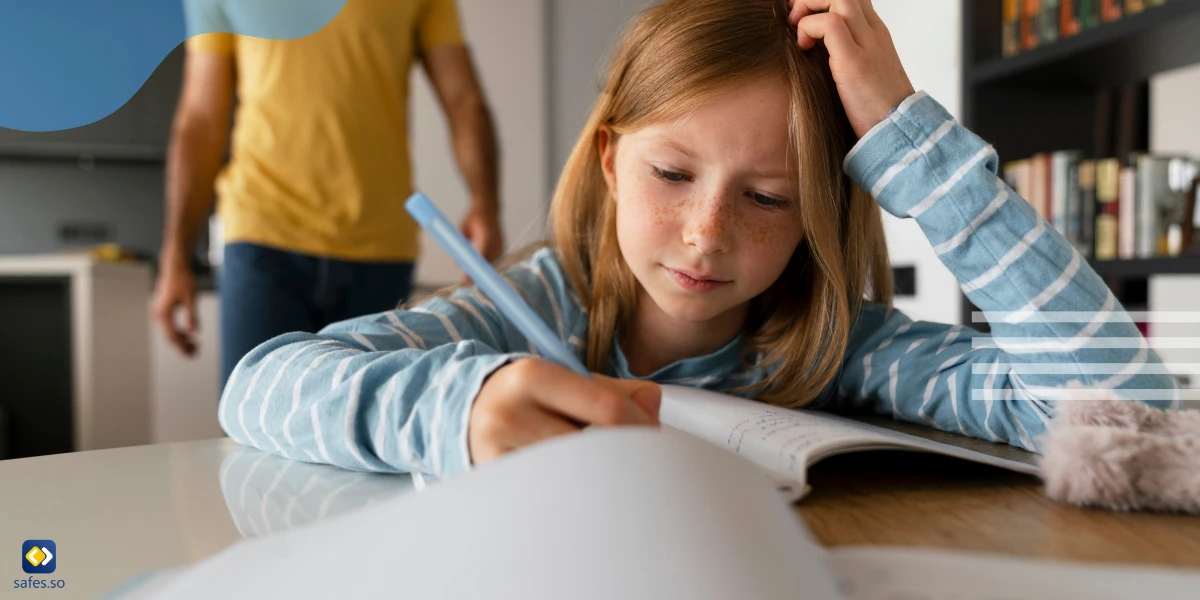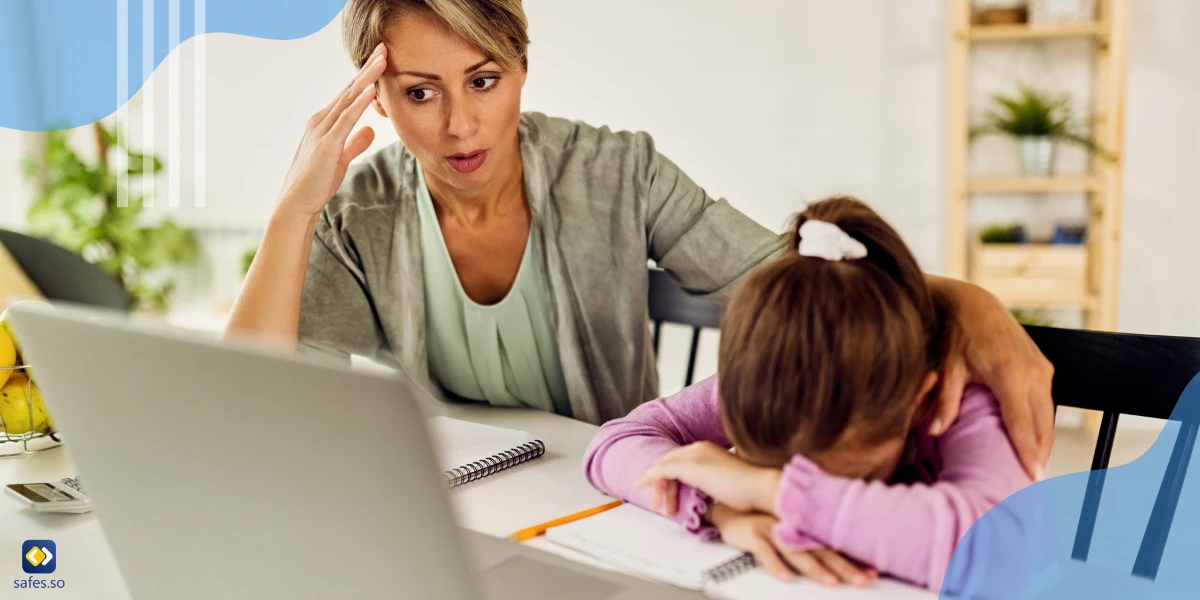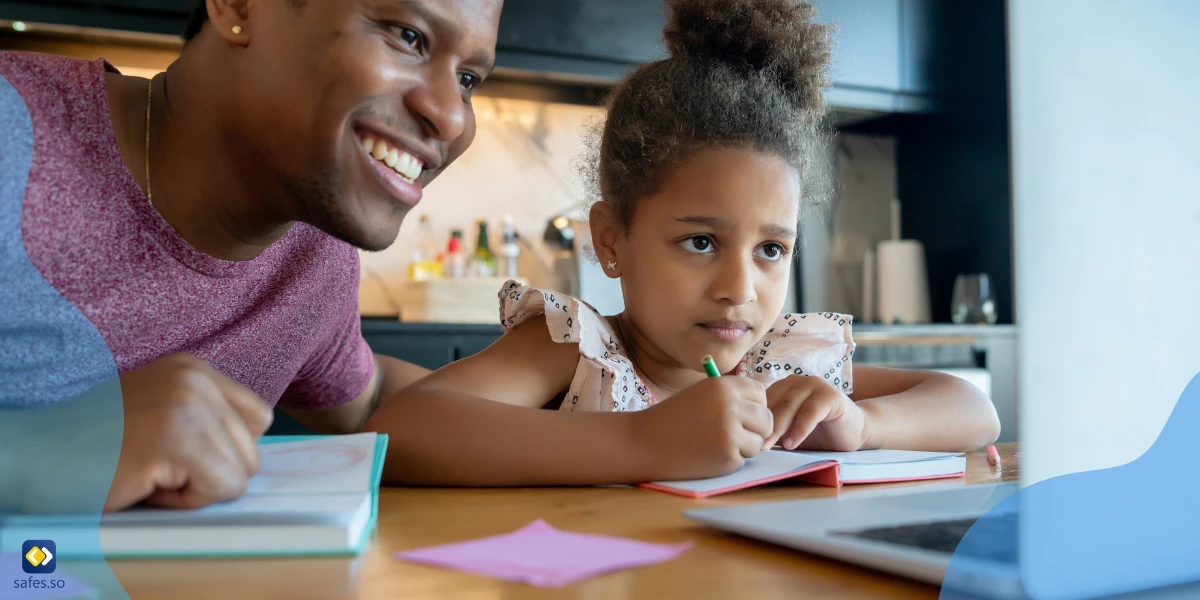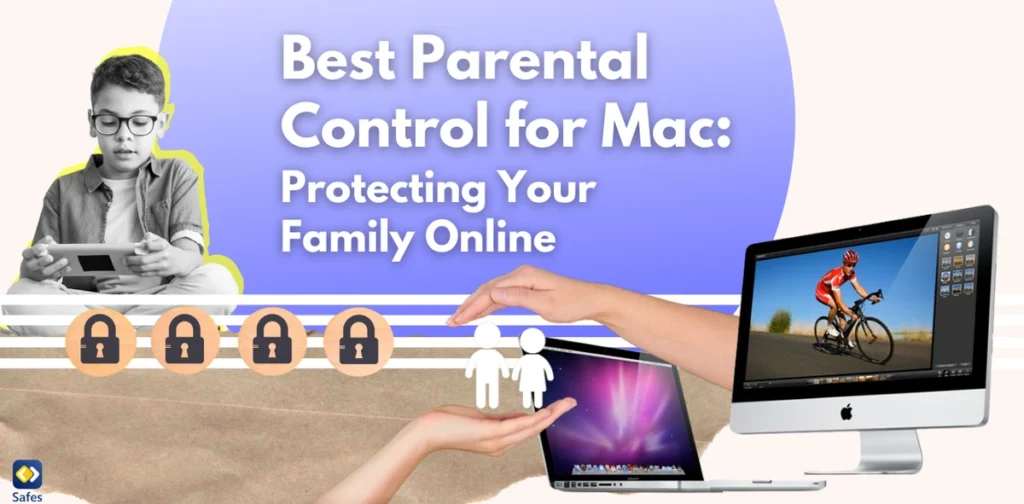Homeschooling has become increasingly popular in recent years, with more and more parents opting to educate their children at home instead of sending them to traditional schools. While homeschooling offers several benefits, including personalized instruction and flexibility, there are also concerns about its potential negative effects on children’s social, emotional, and academic development. In this blog post, we will explore the myths and realities surrounding homeschooling and examine the research on its potential negative effects. Our goal is to provide parents with a better understanding of the potential risks and benefits of homeschooling, so they can make informed decisions about their children’s education.
Download and Start Your Free Trial of the Safes Parental Control App
Negative Effects of Homeschooling
While homeschooling is becoming increasingly popular in many countries, such as the United States, it’s important to examine the disadvantages before making plans for your child’s education. In the following, we will discuss the cons of homeschooling dissected in four areas of academic impact, social impact, emotional impact, and legal and financial impact.

Academic Impact
Homeschooling can lead to a lack of exposure to diverse perspectives and experiences. In traditional schools, students encounter a wide range of teachers, peers, and curricula that can broaden their understanding of the world and prepare them for future success. In contrast, homeschooling can limit exposure to different viewpoints and limit opportunities for social and cultural learning.
Moreover, there is a potential for inadequate or biased curriculum and instruction in homeschooling. While some homeschooling parents are well-versed in a variety of subjects and can provide high-quality education, others may have limited knowledge or use biased materials that do not offer a balanced education. This can limit a student’s ability to think critically and engage with complex ideas.
Overall, while homeschooling can provide certain benefits, parents need to be aware of potential negative impacts on academic achievement, exposure to diverse perspectives, and quality of education. By understanding these risks, parents can make informed decisions about whether homeschooling is the right choice for their family.
Social Impact
One of the key disadvantages of homeschooling is reduced opportunities for socialization and peer interaction. Homeschooled students may miss out on the socialization opportunities that traditional schools provide, such as extracurricular activities, sports teams, and social events. This lack of socialization can lead to difficulties in developing social skills and making friends.
Another disadvantage of homeschooling is the lack of exposure to diverse perspectives and cultures. Homeschooled students may be limited in the range of perspectives and experiences they are exposed to, which can lead to narrow-mindedness and a lack of cultural awareness.
Homeschooling can also lead to a potential for isolation and loneliness. Without the regular interaction with peers and teachers that traditional schools provide, homeschooled students may feel isolated and disconnected from their peers. This can lead to feelings of loneliness, which can have negative impacts on mental health and well-being.
Emotional Impact
Homeschooling can put a significant amount of stress and pressure on parents who become the sole educators of their children. Parents may feel overwhelmed by the responsibility of ensuring their children’s academic success, which can lead to emotional burnout and negatively impact their relationship with their children.
Developing emotional regulation and coping skills is a crucial aspect of social and emotional development that can be difficult to achieve in a homeschooling environment. Children may not have the same opportunities to interact with peers and learn how to manage their emotions in social situations.
Stunted emotional and social development is a potential emotional impact of homeschooling. Without opportunities for socialization and exposure to diverse perspectives and cultures, homeschooled children may struggle to develop the emotional intelligence and social skills necessary to thrive in the real world. It’s essential for parents to be aware of these potential negative impacts and take steps to mitigate them.

Legal and Financial Impact
Homeschooling is regulated by state laws, and parents who fail to comply with these laws may face legal ramifications. The requirements for homeschooling vary from state to state, but most require parents to submit annual reports, keep attendance records, and ensure that their curriculum meets state standards. Failure to comply with these regulations may result in legal action, including fines, loss of custody, and even criminal charges.
Homeschooling can also be a significant financial burden for families. Parents who choose to homeschool may need to give up their jobs or reduce their work hours to accommodate their children’s education. Additionally, homeschooling requires materials, resources, and often a specialized curriculum, which can be costly. Families may also miss out on financial aid or tax breaks that are available to public school students.
Homeschooling can potentially impact a student’s future career and college opportunities. Homeschooled students may not have access to the same resources and extracurricular activities as public school students, which can limit their experiences and opportunities. Additionally, some colleges and universities may require additional documentation or testing for homeschooled students, and employers may not view homeschooling as favorably as traditional schooling. It is crucial for parents to research and plan accordingly to ensure that their children have the best possible opportunities for their future.
Common Arguments in Favor of Homeschooling
Despite the potential negative effects of homeschooling discussed earlier, many people still argue that the benefits of homeschooling outweigh its disadvantages. Many parents worldwide prefer homeschooling their children over sending them to traditional schools. Here are their arguments:
Individualized instruction and attention: One of the primary arguments in favor of homeschooling is that it allows for individualized instruction and attention. Homeschooling parents can tailor their teaching methods to their child’s learning style, pace, and interests, which can lead to a more effective and efficient learning experience. Additionally, homeschooling provides one-on-one attention, which can improve student motivation and engagement.
Ability to tailor the curriculum to students’ interests and needs: Homeschooling also allows for the ability to tailor the curriculum to a student’s interests and needs. Rather than following a standardized curriculum, parents can customize the learning experience to better suit their child’s needs. This can lead to a more engaging and fulfilling learning experience.
Protection from negative peer influence and bullying: Another argument in favor of homeschooling is that it can protect children from negative peer influence and bullying. Homeschooled children are not exposed to the same social pressures as their public school counterparts, which can lead to a safer, more positive learning environment.
Higher academic performance: While some studies have found no significant difference in academic achievement between homeschooled and traditionally schooled students, others have shown higher test scores and more preparation for college. This could be due to personally optimized curriculums, less distraction, and less social interaction.
| Related Articles: |

Counterarguments and Evidence Against These Claims
While these arguments may hold some merit, there are also counterarguments and evidence against them. For example, individualized instruction and attention may not always be beneficial if the parent is not adequately trained in teaching methods or if they become overwhelmed by the responsibility of teaching. Additionally, the ability to tailor the curriculum to a student’s interests and needs may limit their exposure to diverse perspectives and ideas.
Furthermore, homeschooling may not provide the socialization opportunities necessary for a child’s emotional and social development. Without exposure to diverse social situations, homeschooled children may struggle with emotional regulation and coping skills, which can impact their future relationships and career opportunities.
In terms of protection from negative peer influence and bullying, homeschooling may actually limit a child’s ability to develop critical social skills and learn how to navigate challenging social situations. Additionally, homeschooled children are not immune to bullying or negative peer influence, as they may still experience these issues within their homes or social circles.
In conclusion, while homeschooling may have some benefits, parents need to consider the potential negative impacts on their child’s emotional, social, legal, and financial well-being. It’s crucial for parents to be aware of state homeschooling laws and take steps to ensure compliance, as non-compliance can result in legal ramifications and impact future career and college opportunities.
How Can Safes Improve Your Child’s Homeschooling Experience?
The Safes parental control app is designed to help parents manage their children’s screen time and block unwanted apps, which can be especially useful for homeschooling. Through the app, you can set limits on the amount of time your child spends on their devices and block apps that may be distracting or inappropriate. This allows you to ensure that your child is focusing on their studies and not getting sidetracked by social media or other apps. Additionally, the app provides real-time monitoring and alerts, so you can stay informed about your child’s activity.
Overall, Safes can be an effective tool for parents looking to create a more structured and productive homeschooling environment. Safes offers a 14-day free trial for parents to explore its features and see how it can support their homeschooling efforts. It’s available on all smartphones, tablets, and computers powered by Android, iOS, Windows, and Mac. Follow the links below to learn more about setting parental controls on different devices using Safes:
- Windows parental controls
- Macbook parental controls
- Parental controls on Android
- iPhone parental controls
Negative Effects of Homeschooling: Conclusion
In conclusion, homeschooling can provide individualized instruction and a tailored curriculum, as well as protect children from negative peer influence. However, there are potential negative effects of homeschooling on a child’s emotional and social development. To mitigate these negative effects, parents can use tools like the Safes parental control app to manage their children’s screen time and block unwanted apps, creating a more structured and productive homeschooling environment. Ultimately, it is up to each family to weigh the benefits and drawbacks of homeschooling and make the decision that works best for their unique situation.
Your Child’s Online Safety Starts Here
Every parent today needs a solution to manage screen time and keep their child safe online.
Without the right tools, digital risks and excessive screen time can impact children's well-being. Safes helps parents set healthy boundaries, monitor activity, and protect kids from online dangers—all with an easy-to-use app.
Take control of your child’s digital world. Learn more about Safes or download the app to start your free trial today!




